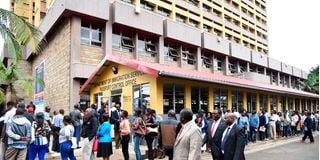Shame of ever faulty passport machines despite annual billions from exchequer

Kenyans queuing for passport services at Nyayo House in Nairobi. Issuance of passports has been plagued by hiccups for years.
What you need to know:
- The Immigration department receives billions in annual exchequer allocations but it is still using old machines that are unreliable.
- Despite numerous promises about improvement of services, issuance of passports has perennial problems.
Questions continue to linger over the frequent breakdown of a passport printing machine at the Directorate of Immigration Services.
Despite the State department receiving billions of shillings in budget allocation every financial year, the defective equipment is yet to be permanently fixed or replaced.
As Kenyans continue to suffer delays in acquiring passports at the hands of the constantly faulty machine, the government’s laxity in addressing the matter is now raising more questions than answers.
Interestingly, only Sh150 million is needed for a new machine, as was confirmed last year by Isaac Ochieng, the department’s head of corporate affairs. This further deepens the puzzle around the matter.
At the centre of the perennial delays in passport applications has been faulty printers. Unavailability of booklets has also been a regular problem.
The immigration department is a big spender. In the financial year ended June 2021, its expenditure was Sh2.4 billion, which increased to Sh2.7 billion in the following fiscal year. It is estimated that Sh2.6 billion will be spent in the current financial year, with the expenditure set to rise to Sh2.7 billion in the financial year ending June 2024.
Despite the hefty allocations, its printing machine continues to break down while booklets are never adequate.
Interior Cabinet Secretary Kithure Kindiki on Wednesday said 42,000 passport applications are yet to be processed by the office.
Promising to clear the backlog within 21 days, the CS indicated that at the centre of the backlog is a piece of faulty printing equipment, which he vowed to fix within seven days.
He added that all applications must be processed within seven days going forward and that emergency applications for medical and educational services will be prioritised and processed within a day.
“To unlock the backlog within the immigration department, I have directed that the 42,000 pending passport applications be processed within 21 days,” said Prof Kindiki.
However, Kenyans took to social media to raise doubts about whether the declaration will amount to anything.
Some spoke of delays that date as far back as last year.
One James Muruge said he is not buying the excuse of the delays in processing passports on the faulty printer, saying that is a ploy used by officers in the department to mint money from desperate passport applicants.
Another one alleged the broken printer works and booklets “magically appear” when an applicant pays a bribe.
“Deal with the corruption going on there. You have to deal with the root cause because even if you fix the printer, they will still say it’s not working to collect bribes!” posted the Kenyan.
The immigration department has, over the years, gained notoriety for being a den of corruption, with middlemen and brokers on the loose.
An insider’s revelation last year shed light on some of the problems in the department. Former Director-General Alexander Muteshi revealed frustrations working at the department, which he said was collecting about Sh12 billion annually but has to beg the Treasury to release funds to purchase new printers and pay its workers.
Obsolete
While appearing before the Senate’s National Security and Defence Committee, he told senators that the current printers are old and obsolete, with a capacity of only 1,500 passports per day.
He noted that new machines could print at least 10,000 passports a day.
“Printing is a process. We have very old printers that can only print 1,500 passports per day. If we buy new machines, we will be able to reduce the backlog by printing 10,000 passports a day,” he said.
Mr Muteshi has since been replaced by Ms Evelyn Cheluget, a career immigration officer who has served in the directorate for 28 years in various senior roles.
According to government data, 426,137 passports were issued in 2022, an increase of 55.9 percent from 2021.
The numbers could be even more amid heightened demand for passports as the renewal or replacement of the old-generation Kenya passport is ongoing.





